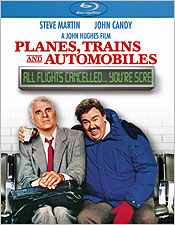and Automobiles
- Rated R
- Comedy
- 1987
- Buy the BD
Reviewed by Ross Ruediger
()
hen John Hughes died suddenly of a heart attack two years ago at the age of 59, folks my age (I’ll be 40 soon) were understandably unnerved. Even though it had been some time since he’d created anything worthy of mass consumption, probably a dozen different projects bearing his name all but collectively define my generation. Hughes was the voice of angst-ridden ‘80s youth, and I dare say that no filmmaker since has come even close to replicating the feat for any subsequent generations on such a consistent basis.
People still wonder, “Why don’t they make movies like ‘The Breakfast Club’ anymore?,” and it’s a valid question that leads to a possibly startling truth: Hughes’ vision was as unique as a Kubrick or a Tarantino. A big difference is that he made it look easy, even though making movies as perfect as Hughes frequently did is anything but. His movies are in fact so timeless in their way that a flick like “Ferris Bueller’s Day Off” remains as relevant today as it was back in ’86.
Now go back to 1994, if you can, and remember when John Candy died suddenly of a heart attack at the age of 43. I was 23 at the time, and 43 didn’t seem all that young to me, but – surprise, surprise – it sure as hell does now. Of course, 43 is ridiculously young, and it’s not as if Candy was a druggie or a boozer or what have you. His biggest social “crime” was being a big guy, and eventually he paid for it, which is very, very sad.
I’ve been on a John Candy kick for a few months now, trying to catch up on some of his later films that I missed. Most of them haven’t been very good, even when he’s good in them. Probably his last great performance was in “JFK” in ’91, and even though he’s only got a scene or two in that movie, you can tell that there were sides of Candy that we never got to see. Candy is the kind of actor who would’ve eventually had a career renaissance, and we would’ve seen those sides that were only hinted at in his early work. I miss John Candy now more than ever, because I miss all the work he never got to do.
One thing that’s amazing about “Planes, Trains and Automobiles” at this point is that it’s anything but a bittersweet or somber experience, despite the tragic passing of these two artists. If anything, “Planes” is more full of life than ever. It’s a movie that ages well, probably because of its simplicity. It’s tempting to hail it as Hughes’ masterpiece, if not for the fact that he’s got at least three or four other masterpieces vying for the title. On the other hand, I have no problem hailing it as Candy’s masterpiece because it was, simply, the finest work of his career.
It’s hard to believe that anyone reading this hasn’t seen the movie, but in case you haven’t, it tells the story of Neal Page (Steve Martin), a priggish marketing stiff headed home to Chicago from New York City a couple days before Thanksgiving. One disaster after the next precludes this from happening, all while he’s dogged every difficult step of the way by Del Griffith (Candy), an irritating yet somehow lovable travelling shower curtain ring salesman. (Many of the disasters in question are inadvertently caused by Del.) That’s pretty much the gist of the film, and it doesn’t need to be any more complex since it has three massive talents at the top of their games steering the ship.
“Planes, Trains and Automobiles” is the Thanksgiving staple for my family. Thanksgiving isn’t a holiday that gets a lot of attention in the movies, and most films that do tackle the festivities tend to treat it as something of an emotional disaster for the parties involved. “Planes” goes for an unexpected angle in that it explores the desire for an ideal Thanksgiving, which is largely a common American truth. We all want perfection on that day, and in most cases, the desire is more powerful than the reality. Amazingly, despite the whole movie seemingly building towards a perfect Thanksgiving meal, we never see the dinner in question. This would be the ballsiest thing Hughes did with the movie if not for one scene consisting of Steve Martin, Edie McClurg and the word “fuck” used 18 times in 60 seconds. It still boggles the mind that the scene was not only included in this otherwise squeaky clean holiday family film, but that it manages to be quite possibly the funniest scene in a flick that offers up one laugh after the next.
But “Planes, Trains and Automobiles” is more than just a funny movie. While its humor goes from broad and farcical to quietly witty, what makes the movie so successful is how much we come to care about Neal and Del within 90 minutes, despite their frequently deplorable, antisocial behavior. There’s a dramatic melancholy that pervades the film, from as early as the opening scenes, that’s the key to the film’s real success. The movie was a part of a turning point for Martin, as he wasn’t previously known for playing such serious men, but in ’87 he played both Neal and C.D. Bales in “Roxanne,” and rarely did he play a wild and crazy guy ever again. The film was a turning point of sorts, too, for Hughes and Candy, although the pair didn’t fare as well as Martin. While “Home Alone,” which Candy had a small role in and Hughes wrote, may have been the highest grossing film of both men’s careers, few will put it in the same category of inspired creativity as “Planes, Trains and Automobiles,” or even “Uncle Buck,” for that matter.
Those Aren’t Pillows Edition Blu-ray Review:
On the high definition front, the highlight here is an hour-long documentary entitled “John Hughes: Life Moves Pretty Fast,” which is broken into two parts. The doc perhaps unsurprisingly concentrates on only Hughes’ work for Paramount, which sounds limiting, yet you’d be surprised at how much can be gleaned from the man’s career based only on exploring this movie, “She’s Having a Baby,” “Ferris Bueller’s Day Off,” “Pretty in Pink,” and “Some Kind of Wonderful” (the latter two of which Hughes only wrote). Also in HD is the deleted scene of Neal and Del eating on the plane (surely everyone has seen this by now, right?). On the standard-def front is “Getting There is Half the Fun: The Story of ‘Planes, Trains and Automobiles’,” a half-hour piece that mostly consists of an archive press junket with the three men talking to a roomful of journalists, wrapped around various talking heads. Other short featurettes include “John Hughes for Adults” and “A Tribute of John Candy,” both of which are cut from the same cloth as the main SD featurette.
You can follow us on Twitter and Facebook for content updates. Also, sign up for our email list for weekly updates and check us out on Google+ as well.












